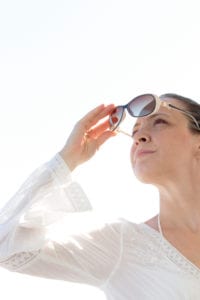
It’s easy to put sun damage in the box of skin health, but we’ve got to remember that the eyes are also affected by many factors, including the sun. Did you know that, just like your skin, the corneal tissue in your eyes could get sunburned? Did you know that persistent sun exposure over the years can significantly increase your risk of cataracts, not to mention cancer of the eye? These are details about eye health that can be easy to overlook. With May being Ultraviolet Awareness Month, there’s no time like the present to discuss what we should be doing to avoid unnecessary eye damage.
Rain or Shine, Ultraviolet is Always Around
We are particularly susceptible to the damaging effects of ultraviolet light when the rays are intense. However, it is vital that we remember that UV light is always around. Even shining through the clouds, this type of light presents risks. That means we do ourselves the most good by wearing appropriate protective products like sunscreen and sunglasses and also by knowing what risks apply to our unique situation.
Ocular sun damage may occur when:
- A person has light-colored eyes.
- There is a family history of eye cancer or cataracts.
- A person works outdoors most of the day.
- Outdoor work or hobbies are performed without sunglasses.
Did you catch that we said, “without sunglasses?” Wearing sunglasses isn’t all about fashion, and it’s not all about reducing the brightness of the sun for the sake of comfort. Sunglasses are an essential accessory that blocks ultraviolet light and therefore protects the eyes from long-term damage. A good pair of sunglasses is one that will block 99 to 100% of ultraviolet light rays. Some people also add polarization to their lenses to reduce glare. The more time that is spent outdoors, the more valuable polarized lenses may be.
Additional assistance for lifelong eye health comes from routine ophthalmologic screenings. We are happy to provide comprehensive services to the residents of Central Florida. To schedule a visit with us, call (352)-237-8400.




